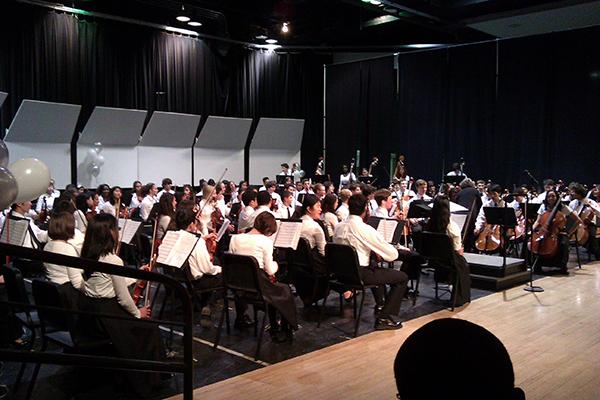Tuning-up for Life
Students and staff consider the benefits of music education

Shaina Wolinsky, a senior in the BHS band, started on the trumpet in fifth grade, switched to the double french horn and mellophone in ninth grade, then picked up the saxophone just for fun.
She studies music because she has always enjoyed band class.
“It’s a fun class,” she said. “It’s a way for me to de-stress. I’ve made a lot of good friends, and I like playing music. So it’s something that encompasses a lot of what I love.”
Music education classes can provide a welcome relief for students from more stressful standard academic courses. But what benefits do they provide students in the long run?
Sindya N. Bhanoo recently addressed this issue in the New York Times. She described a recent study:
“Older adults who took [music] lessons at a young age can process the sounds of speech faster than those who did not.”
Jason Chuong also addressed this issue in the Huffington Post. According to Chuong, music education can help failing students by giving them the motivation they need to get up and go to school.
Shaina Wolinsky believes music has helped her academically. “Music has taught me to take my time, to slow down and if something isn’t good, to go back and fix it,” she said.
Wolinsky also feels it has helped her in other aspects of her life, and will continue to benefit her in the future. “It has definitely helped me make friends,” she asserted. “In band is where I’m most comfortable and most relaxed.”
Whether or not Wolinsky decides to follow a career in music, she feels that music will continue to be an important part of her life.
“I will never stop playing music,” she declared. “I may not study it in college, but I definitely don’t want to just stop playing. I’ll play for fun.”
Wolinsky also believes that music will help her achieve her future goals, whatever they may be.
“Music has taught me discipline,” she said. “It’s pushed me, and shown me that if I want something bad enough, I can get it.” Also, “if I stress out, I can go to my music, I can play, and then I can move forward.”
Ami Scherson, a junior in the BHS orchestra this year, has also studied music fairly extensively throughout her life. She has taken eleven years of piano, four to five years of cello, four years of music theory, one and a half years of voice, and has attended music camps.
Like Wolinsky, she believes that music education has helped her succeed academically.
“Because of my music education I have more discipline,” she said. “It has affected the way I perceive new ideas and concepts, and it has helped me with concentration.”
She also feels that music has benefitted her in other aspects of life.
“Anytime that I am stressed out, I go to music,” she said. “Listening to it, writing it… whatever.”
“It’s the one thing that I’ve had a passion for since I was little,” Scherson said. “I was never forced into it. My parents just guided me into it. I study it because it makes me happy.”
As for plans for a future career in music, she is uncertain. “Now I’m not sure,” she said.
“I used to want to be a music teacher, or go into music business or music producing. I’d want to be behind the scenes,” she said.
Whatever she decides to do, she believes that music has influenced her goals. “My artistic ideas come from music,” she said. “So it will influence me in anything that I might choose to do.”
According to Band Director David Luddington, music education improves math scores. Additionally, many band students receive top ACT scores and are on the list of National Merit Scholars.
“And those are just the tangible, measurable benefits,” he said.
Luddington’s claims are supported by a NAMM Foundation (International Music Products Association) press release:
“Middle school and high school students who participated in instrumental music scored significantly higher than their non-band peers on standardized tests.” According to the NAMM Foundation web site, studies performed in universities in Georgia and Texas “found significant correlations between the number of years of instrumental music instruction and academic achievement in math, science and language arts.”
Orchestra Director Lisa Goldman has a similar point of view on the academic benefits of music education. “It allows you to think about things differently,” she said. “It helps you to pull your information in, and learn to take it apart in a new way, and put it back together… and it allows you to have different observation skills.”
“You learn a lot of cooperation skills,” she continued. “There are different skills of thinking, listening, observing, and cooperating.”
In Luddington’s opinion, music education can help students learn teamwork and independent preparation from deciding how to go about working on music pieces, especially in an ensemble setting. In band specifically, seniors often pick and help write some of the shows for the year, as well as teach younger students, which develops leadership skills.
“Music can help people who aren’t very good at expressing their feelings,” he said. “It teaches communication skills.” For example, “some people who can’t speak very well in front of other people may be able to play their instrument in front of others and perform.”
“There is a long list of people who are musicians who are successful in other fields,” Luddington added. “Music teaches you that doing something that’s difficult takes time and dedication. It takes pushing yourself when you’re tired and really sick of practicing. It helps people dedicate themselves to achieving their goals.”
Goldman agrees that music training can help students achieve personal and professional goals unrelated to music. “The most common major for people applying to medical school after math and science is music,” she said.
“I’ve always had music in my life,” said guidance counselor Ashley Saferight. “Music has always been the thing that I can go back to. It is never stressful to me because it is not my career. Music is the thing that helps me relax when the other things in my life are stressful. It’s always that positive in my life.”
Saferight traveled to Germany, Austria, and the Czech Republic with her choir in college, received a bachelor’s degree in music, and now has a private voice studio. She began singing in organized school choir in third grade, and has continued in various choirs ever since.
“Being able to study the thing that was my passion has helped me be satisfied,” she said. “Having music in my life helps me get through the day and tough times. Music is a huge part of my life.” Also, “Music made me interesting to other people when I was looking for jobs.”
“Every interview I’ve been in asked me about my music major,” she said. “Most jobs that want you to have a four-year degree, don’t require you to have a specific degree. I have been able to reach my goals and find a career not teaching music.”
Her training in music not only gave her another area of expertise, but it also helped her when applying to graduate programs. She applied to Georgia State University, which is one of the most respected universities for guidance. She thought that her bachelor’s degree in music would be a negative, but found out that they were looking for students with different types of backgrounds.
“It helped me to have a music degree because it made me stand out in a pile of applicants,” she said.
Saferight offered some advice for students who are considering pursuing a degree in something that is not related to a specific field.
“Have an idea of what type of field you do want to go into, and make sure that what you study won’t slow down your path to that field. If you are considering careers, you should keep in mind what you need to get done in order to get there. You could always double major or double minor to finish your requirements.” Also, “Know what you’re getting into.” Many students who originally want to major in music end up dropping out of the major because they don’t realize how much work it is.
Ashley Saferight’s musical training has also benefitted her in other aspects of her life.
“I learned that it’s okay to pursue your passion,” she said. “It made me unafraid to do something that other people didn’t necessarily understand, and gave me the courage to not be afraid to do things that matter to me.” Even though she pursued a career unrelated to music, she does not regret her choice to major in music. “It is part of the journey that led me to where I am today. Which is where I think I am meant to be.”









